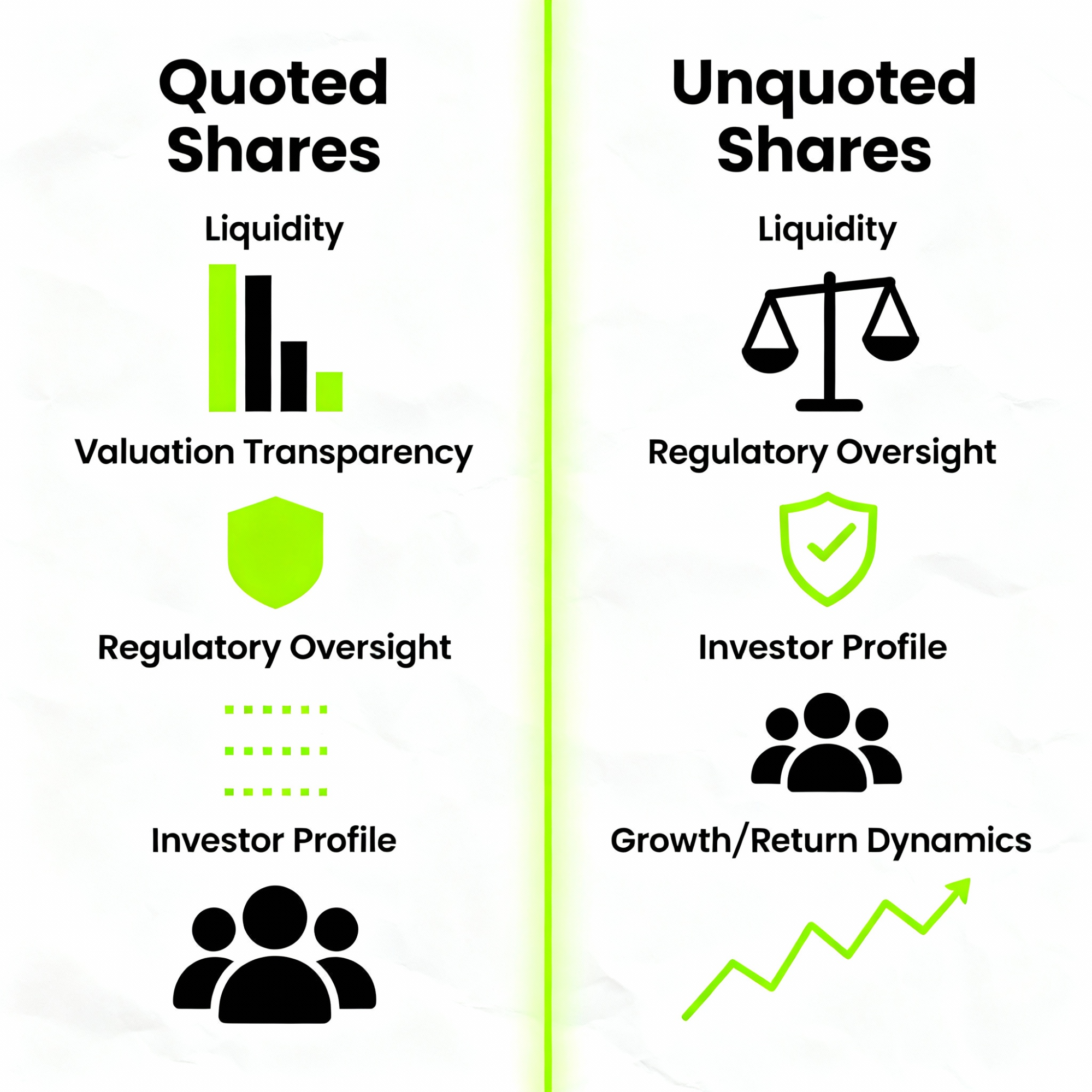Unquoted shares hold a special position in the investment arena with entry to privately held companies and early stage ventures prior to them going into the mainstream. Unlike the shares traded in the stock exchanges like the National Stock Exchange (NSE) or the Bombay Stock Exchange (BSE), unquoted shares are not listed and thus, they do not have a centralized market and transparent real-time prices. However, they are of great attraction to the people who want diversification of their portfolios beyond the conventional equity markets.
Unquoted Shares Meaning Explained
In essence, an unquoted share is an equity in a firm that has decided against trading its shares in a known stock exchange. These companies are family owned businesses, start up companies that have grown rapidly and also niche subsidiaries of global companies. Since the shares are not listed, their price discovery process is essentially different: the valuations are based on situations of internal dealings between the purchasers and the sellers, using financial ratios such as earnings multiples, discounted cash flow analysis, book value comparison, or comparative with the valuations of similar companies.
This is an opaque process of valuation where investors cannot just get on a trading platform and make a sale at the current market rate. Rather, transactions involve locating a buyer or seller who is interested in purchasing or selling at an agreed price and this is often facilitated by intermediaries like investment bankers, the unlisted share dealers or special legal advisors. Liquidity in the unquoted market is therefore minimal and intermittent, although to long-term investors that are happy to hold positions by financing privately and to IPOs, the payoffs can be high.
Difference Between Quoted and Unquoted Shares

➢ Access and Liquidity in the market: Quoted shares are subject to continuous trading on the stock markets and are traded by market makers and a large base of investors who are certain to ensure that the deal funds are completed in a very short time at transparent prices. Unquoted shares, on the other hand, may not be bought or sold. An investor may take months before he can sell off his holding and he may need to offer a large discount to cause a sale.
➢ Valuation Transparency: Under intense regulatory frameworks, the financials, direction and decisions of the board of directors of public companies have to be published and hence the share prices of the companies can be regarded as an indicator of the overall investor attitude and corporate performance. In the private world, visibility is limited and usually confined to only a few investors and hence subjective valuations which vary with every round of funding, changes in competitive landscapes or strategic milestones.
➢ Regulatory Oversight: The market regulators such as the Securities and Exchange Board of India (SEBI) are in charge of the quoted equities which apply the continuous disclosure, insider trading regulations, and uniform corporate governance. Unquoted shares follow the Companies Act and the limited SEBI regulations regarding the types of private placements and therefore, have fewer checks and balances of the company in the form of the public however, with less compliance costs borne by the issuer.
➢ Investor Profile: The retail investor can easily invest in quoted markets through demat accounts with the help of brokers, wealth managers or robo-advisors. Unquoted shares are usually more expensive to invest in, more advanced and involve contact with venture capital funds, angel networks, or private equity dealers.
➢ Growth and Return Dynamics: The listed companies are characterized by mature business models and stable cash flows with moderate growth, which is reflected in stable but low growth. Unquoted companies, although, are typically pre-expansion stage businesses or family-owned businesses that have a potentially significant multiples upon exit events, often through IPOs, corporate acquisitions or secondary buyouts.
Why Companies Issue Unquoted Shares
Unquoted share issues are made at companies due to a number of strategic reasons that trade off growth requirements against the expenses and liabilities of a public issue:
➢ Early-Stage Capital Raising
New companies and startups need to raise funds to invest in product development, market penetration, and expansion. They get essential financing without the wide disclosure demanded in a public offering by selling the unquoted equity to an angel investor, venture capitalist or a private equity firm.
➢ Acquisitions and Strategic Partnerships
Unquoted shares may be used as forging alliances tools. A giant corporation may purchase an interest in a new technology or new market segments at an innovative startup through a private sale of shares, having a preferred right to access new technologies or markets without a public announcement.
➢ Incentive Programs
Incentives are usually awarded to key employees by the private companies through stock options or limited stock units in alignment to long term value creation. These shares are not listed until a liquidity event being a culture of ownership and retention of personnel considered critical.
➢ Preparation for Future IPO
Numerous unicorns, such as Zomato and Paytm, which are companies with a valuation above 1 billion dollars, raise new funding rounds in the private market and consider IPO when they are already set. In the process of each round a new valuation is fixed, which progressively forms a track record on which future pricing in the public market is based.
Importance of Unquoted Shares in Investing
To investors, unquoted shares broaden the horizon of opportunity through the more traditional stock markets opening an arsenal of benefits:
➢ Premature access to High-Growth ventures
Capital is invested together with founders in the earliest stages of investing in unquoted shares. Early investors are able to get disproportionate returns when companies make breakthroughs, which can be in terms of product launches, regulatory approvals, or market expansion, and this can be in terms of multiples and not in terms of percentage.
➢ Private Markets Diversification
Most portfolios are dominated by public equities, bonds, and mutual funds all of which are vulnerable to the macroeconomic cycles and market sentiment. The issue of private investments is that they are likely to lose their relationship with the daily movements of markets since appraisals are dependent on isolated corporate occasions. This non-correlated action can level off aggregate portfolio volatility.
➢ Less Sensitivity to Short-term Volatility
New valuations of unquoted shares are not subject to effect like listed stocks to any surprise in earnings or geopolitical events or algorithmic trading. To the patient, long-term investors, this fundamental emphasis can reduce anxiety and reactionary action.
➢ Access to Niche Sectors
Numerous targeted companies, including biotech startups, proprietary fintech applications, or deeptech ventures, are kept private over a long time. The unquoted share markets can offer access to such high-barrier sectors which can be closed to public offers until years after.
Risks and Challenges of Investing in Unquoted Shares
The attractiveness of the private equity industry is accompanied by high risk and complexity. The potential investor should consider the following challenges:

➢ Severe Illiquidity
The departure of an unquoted investment can be done by waiting for a certain liquidity event, an IPO, acquisition, or a secondary sale. It can result in long-term investment in assets that cannot be liquidated to provide flexibility within the investor, which increases opportunity cost.
➢ Opaque Valuations
In the absence of real time market pricing, values are based on infrequent funding rounds, similar transactions or internal financial models. Unrealistic growth prospects may populate the share prices and, without a sound due-diligence procedure, investors will overpay.
➢ Inadequate Financial Disclosure
The disclosure regime is not applicable to the private companies as it is to the public ones. The quality of financial statements, the rigor of audit and commentary by the management might not be as detailed, thereby making it difficult to assess corporate revenue quality, rates of cash burn or contingent liability.
➢ Regulatory complexity and Legal complexity
The process of transfer of unquoted shares in India comes in the terms of compliance with the Companies Act, SEBI regulations on the issue of a private placement, stamp duty, and the board approvals. These layers of process incur delays and transaction costs absent in the case of the transfer of shares by a public.
➢ Taxation Nuances
The Indian tax laws may treat capital gains on unlisted shares differently, such as fair market value measurement and the holding period to provide the concessional rates. The tax-computed valuations and the prices on a private transaction may be misaligned, which will wipe off net returns.
➢ Potential for Fraud
Without close regulatory focus, dishonest promoters or intermediaries can give a false picture of financials, ownership, and exit opportunities. Strong legal contracts and third-party audit is required as a safeguard.
Conclusion
Unquoted shares are a lucrative yet challenging frontier to the investment world. They provide a unique look at the closed world of private business, allowing them to be early adopters of innovation, entrepreneurship, and wealth creation, which otherwise frequently beats the market by a significant margin. However, the same characteristics that draw these opportunities include the lack of regulation, customized valuations, and illiquid transactions that also increase the risk.
Effective negotiating of unquoted shares investments requires a long-suffering, scholarly attitude, in association with a professional understanding of valuation techniques, legal structures, and industry dynamics. When it comes to those who create the necessary networks, which are the angel groups, venture capital circles, and special brokers, the possible payoffs are the outsized returns and portfolio diversification. Nevertheless, the investors need to balance the ambition with due diligence, prudent allocation, and long holding period acceptance.




